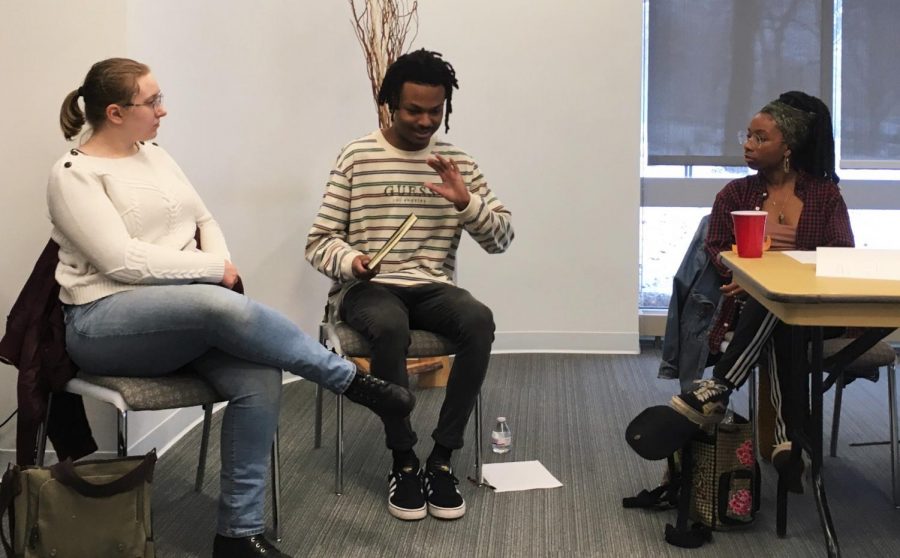Evening of Entropy envelops Englewood
A student panel reflects on the intersections of black identity and faith.
From left, sophomore and co-coordinator Frances Verner; sophomore, co-coordinator and host Stef Holland; and senior and panelist Aria Gilliam speak at the Evening of Entropy panel on April 10.
April 17, 2019
Though sophomore Stef Holland, sophomore Guled Said and senior Aria Gilliam follow different religious paths, all came together for an April 10 panel, titled Evening of Entropy, to explore the connections between their faith traditions and their African-American identity.
“Black places of worship in general have always been places where black people can come together and have dialogue,” Holland, co-coordinator and host of the panel, said.
Evening of Entropy was held in Sorin’s Gathering Place. Sophomore Frances Verner and Coordinator of Religious and Spiritual Life Programs Zan Christ collaborated with Holland to organize it. In addition to Said and Gilliam, a third panelist was slated to contribute, but was unable to attend due to weather.
A point referenced frequently throughout the discussion was the juxtaposition of two prominent twentieth-century black spiritual figures- Malcolm X and Martin Luther King, Jr.- as foils and rivals, both in terms of religious belief and approach to social change.
“We kind of normalize this idea that [MLK] was a pacifist… We always place him in conjunction to Malcolm X, and this idea that Malcolm X was violent,” Gilliam said. “We forget that Malcolm X and MLK were friends who learned a lot from each other.”
Said, a Muslim, especially credits Malcolm X with helping to shape his philosophy and understanding of his faith, from the time he first read his memoir in eighth grade.
“As a young’un, I was a troublemaker. It took a black security guard to come up to me and give me ‘The Autobiography of Malcolm X,’” Said said. “When I read that book, it really changed my life and changed my perspective on everything.”
The panelists described the experience of coming into their own faith as adults for the first time. Gilliam was raised by her father, a Baptist minister in Arkansas.
“‘Wake up, go to church. Wednesdays, go to Bible Study. Saturdays, go to choir practice’” is how Gilliam described the religious routine of her youth. Then, “I began questioning, I realized that many of my beliefs were formed by the imposition of Christianity on me and not by my choice.”
Now, Gilliam says the description that best fits her current beliefs is Ecowomanism, with an emphasis on obligation to and connection with the earth, although she dislikes the imposition of a label.
“I still believed in the Most High, I still believed in something greater than myself,” Gilliam said. “Now I’m at a point to where I’m choosing what I believe, and I’m developing the language to articulate why I believe what I believe.”
Said reflected on his spiritual maturation since adolescence. Though he remained in his childhood religion, he, like Gilliam, also had to choose his beliefs.
“When I was in high school and I would pray, I didn’t have intentions. Now when I pray I have intentions, knowing that the struggle keeps going on. I’m praying for better days,” Said said. “Like [Gilliam] said, you have a choice… Islam was the perfect religion for me. I felt perfect, I felt righteous, I felt like a better person in general.”
Despite productive discussion and Holland’s passion for multifaith communication in the black community, attendance was sparse, and Said blamed more than the untimely snowstorm.
“I believe that black people can benefit from interfaith dialogue, but I also feel like nobody would have that dialogue,” Said said. “Look at the size of this room. We’ve got two black folks attending, and we’ve got a school full of black people.”



Ann Karendatter • Jun 18, 2019 at 11:40 am
Excellent job all! Go Hamline Pipers!